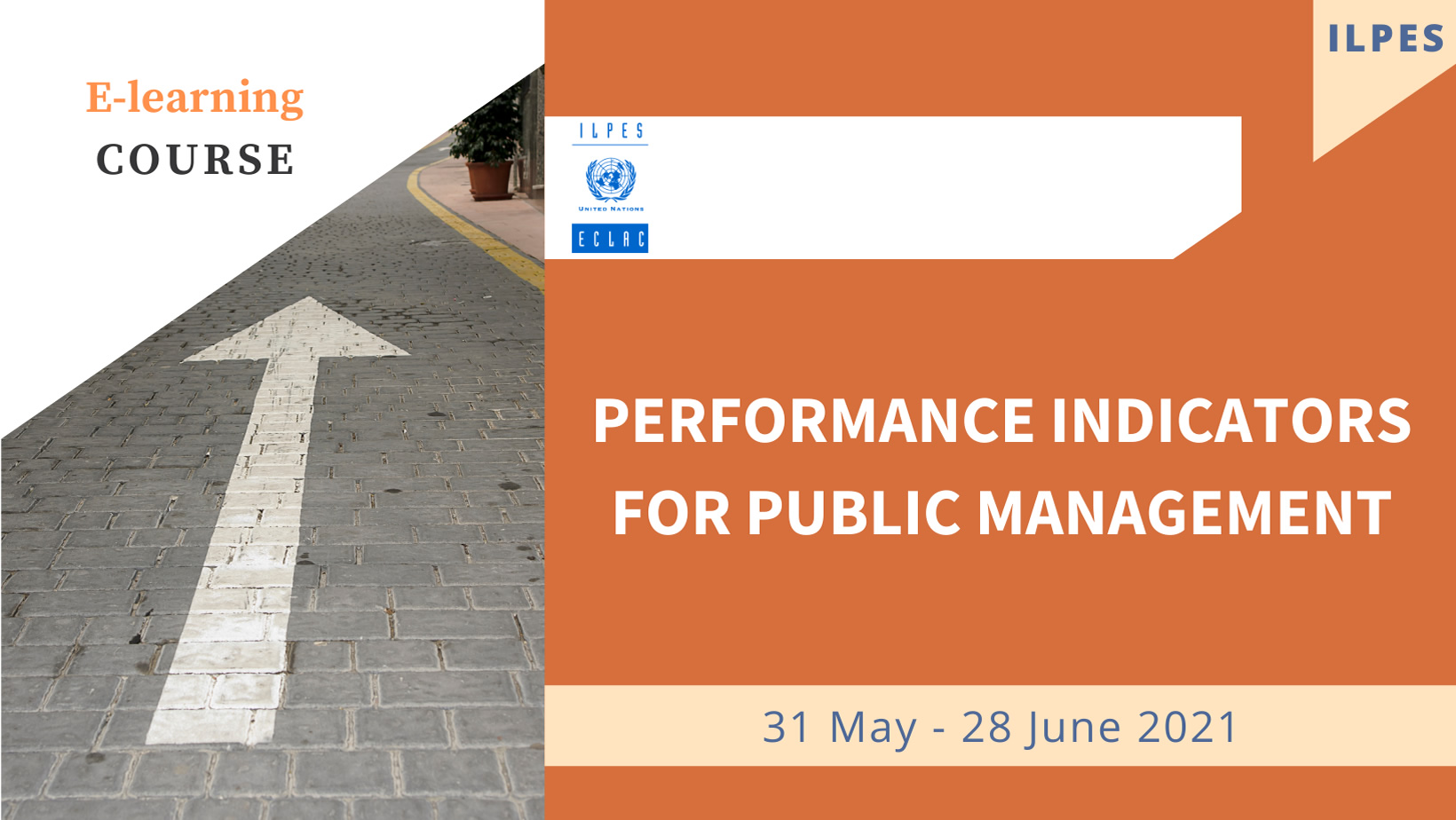Performance indicators for public management
Work area(s)
Topic(s)
The Course is organized by the Latin American and Caribbean Institute for Economic and Social Planning (ILPES), of the Economic Commission for Latin America and the Caribbean, ECLAC.
Course information

Type of course
Training method
Course language
Geographic scope
Date
31 May - 28 Jun 2021, 13:15Date of registration
18 Jan - 02 May 2021Status
Financing type
Price
Financing
Participants are encouraged to seek financing from their own institutions to cover the course recovery fee.
Target audience
General Objective
This introductory course seeks to develop and strengthen participants' capacities to formulate performance indicators as an important tool to strengthen public management planning, budgeting, monitoring and evaluation systems.
Learning Goals
- To introduce students to the concepts of public management and provide a framework for performance indicators.
- To understand the fundamental components of an indicator for its definition and design.
- To understand the different types of indicators and their use.
- To practice formulating different types of performance indicators.
COURSE DURATION
The course has a duration of four (4) weeks, totaling 20 academic hours, with an estimated average load of 1 hour per day. The work is mainly asynchronous; that is, students can work individually on the contents at the times that suit them. However, there will be non-mandatory instances of plenary group interaction.
COURSE METHODOLOGY
During the e-learning course, the contents of the thematic units are delivered in multimedia and interactive formats; pedagogical resources that each participant must undertake in a self-instructional mode. The participants will be provided with lessons and questionnaires, through which they will be able to consolidate concepts and develop knowledge on indicator definition and formulation.
The educational activities are complemented by discussion forums and practical exercises per module, in which participants can also apply course contents.
At the end of each module, a self-test must be passed in order to continue with the following units.
The learning resources used are:
- ECLAC Moodle Platform
- Digital Learning Objects
- PDF files with supporting bibliographic documents
- Course Platform
In addition to the asynchronous activities, there will be video conferences between teachers and students, to initially present the course, to clarify technical questions and finally to wrap up the course. These meetings will be recorded on video and will be available on the course platform. The participation in these activities is voluntary and is not a requirement to pass the course.
APPLICATIONS
All those interested in applying for the course must complete an online registration form available at the following link: http://sigcaportal.cepal.org. A practical guide on how to apply in this system can be found by clicking here.
Step 1: You must register as a user of the ILPES Integrated Training Management System (SIGCA). If you are already a registered user, you must enter your username and password in the portal and follow step 2.
Step 2: Apply to the course and complete the form with the requested data, before the application deadline.
Applications will be received until Sunday, May 2, 2021. Applications received after this date will not be considered in the selection process. Subsequently, confirmation of acceptance to the course will be sent via e-mail to the selected candidates, to which they must respond confirming their participation. The non-confirmation of participation will allow the integration of other applicants who are eligible to participate in the course.
Programme
The course will first address conceptual aspects of public management, and of monitoring and evaluation. Then, the elements needed to develop performance indicators will be discussed in detail. Examples and practical exercises based on public programs in Latin American countries are used throughout the course to provide real case references for participants.
The topics and contents have been organized into 4 Modules and 10 Units, as presented below.
Additionally, a voluntary Module 0 will be available, where the strategic thinking of ECLAC for the development of Latin America and the Caribbean is presented through readings of the principal policy documents of ECLAC.
MODULE 0. Context of ECLAC
MODULE 1. Introduction to Performance Indicators.
- Unit 1. Public Management, Basic Concepts
- Unit 2. Indicators, Basic Concepts:
- Unit 3. Monitoring, Follow-up and Evaluation
MODULE 2. The Elements of an Indicator
- Unit 4. The Structure of an Indicator
- Unit 5. Indicator Results and Outcomes
MODULE 3. Classification of Performance Indicators
- Unit 6. Indicator Control Areas
- Unit 7. Performance Dimensions
- Unit 8. Control Areas and Performance Dimensions
MODULE 4. Indicator Validation and Technical Meta Data
- Unit 9. Indicator Validation
- Unit 10. Indicator Technical Meta Data
Attachment(s)
Country(ies)
- Latin America and the Caribbean
Organized by
Instituto Latinoamericano y del Caribe de Planificación Económica y Social (ILPES), CEPAL
- http://www.cepal.org/ilpes/
- (56-2) 2102507
Contact
Lucy Winchester, ILPES
- lucy.winchester@cepal.org
- (56-2) 2210-2509
Soledad Seguel
- soledad.seguel@cepal.org
- (56-2) 2210-2615
Daniela Gebhard
- daniela.gebhard@cepal.org
- (56-2) 2210-2630